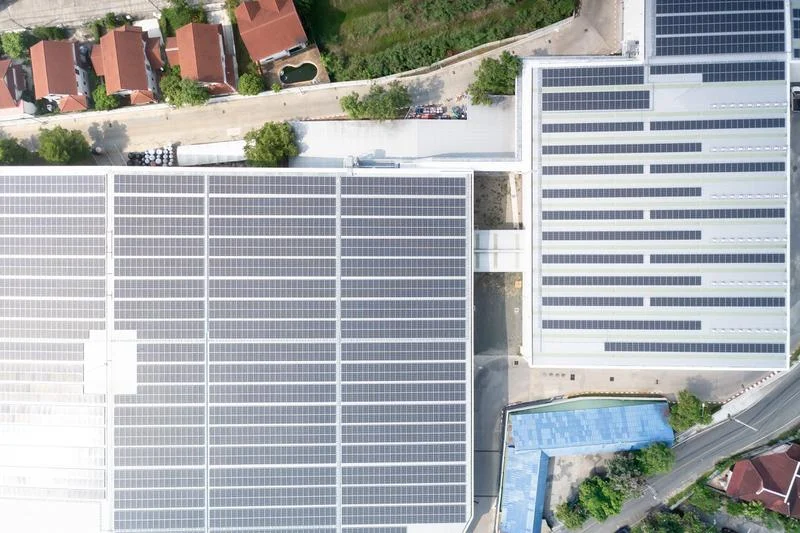Commercial solar installations are changing the paradigm of energy usage and interaction for businesses. From slashing your utility bills to beautifying your brand as energy-conscious, such systems have a myriad of benefits. In this article, we shall delve deep into commercial solar installations, how it operate, pricing, pros and cons, and whether it is worth investing in your commercial building.
What Is a Commercial Solar Installation?
Commercial solar installation consists of roof-mounted photovoltaic equipment-including solar panels, inverters, and optional battery storage installed on commercial buildings or sites. The installations are mainly intended to provide companies with electricity from a renewable source while lowering their connection to the traditional power grid.
The essential components of the system include:
- Solar panels: They absorb sunlight and convert it into electricity.
- Inverters: Converts the direct current generated by solar panels into usable alternating current.
- Optional upgrades: Such as battery storage, electric vehicle charging, and solar carports.
How Does a Commercial Solar System Work?
This is how commercial solar systems work to convert sunlight into energy:
The solar panels start working-an incoming stream of sunlight hits the solar panels, creating a direct current.
Inverters come in direct current is converted to alternating current for use by inverters or micro-inverters.
Electricity is supplied to the building for its daily energy needs: The electricity that is converted is supplied to the buildings directly for its day-to-day needs.
Where does the excess power go: In case you still have leftover electricity using up all of it becomes hard, you might have:
Sending it to the grid-Excess electricity is sent to the grid, which even reduces your electricity bills, thanks to net metering policies.
Storing it-Suppose you have a battery system, then this excess electricity can be stored and used later.
Where Can Commercial Solar Panels Be Installed?
Commercial installations of solar energy systems are much more flexible and adaptable for a variety of mounting configurations including;
roof systems, which are very commonly employed especially for flat roofs, ground-mounted arrays for land-owners, solar parking lots with panels mounted above parking areas, and pole-mounted (panels) fitting solitary use such as for streetlights.
How Much Do Commercial Solar Installations Cost?
According to recent SEIA data, the average cost per watt for commercial solar installations is about $1.46. Here's a cost breakdown based on system size:
| System Size | Typical Application | Estimated Cost Range |
| 1–5 kW | Parking meters, exterior lights | $1,450–$7,300 |
| 50–100 kW | Small buildings, schools | $73,000–$146,000 |
| 100–250 kW | Mid-size buildings | $146,000–$365,000 |
| 250–500 kW | Hospitals, factories | $365,000–$730,000 |
| >500 kW | Large campuses, malls | $730,000+ |
Why Are Commercial Solar Systems Cheaper Per Watt Than Residential?
The larger system would have a lower cost per watt, which modifies the soft cost of design and licensing. However, the total cost for the project would still be greater for a larger system.
Factors That Influence Commercial Solar Installation Costs
A number of factors influence the ultimate cost of a commercial solar installation:
- System size: The most significant cost factor. Small installations will be much cheaper than large systems, which must service the entire building.
- Mounting location: Flat roofs, roof-mounted installations, and ground mounts all have different installation requirements and labor costs.
- 3Add-ons: On-site battery storage or charging stations for electric vehicles could be more expensive, but in some cases, they're a must-have.
- Available incentives: Incentives tied to utilities, rebates, and tax credits can significantly lower your upfront cost. For example, the federal Investment Tax Credit (ITC) can reduce your cost by as much as 30%.
Benefits of Commercial Solar Installations
- Reduced operating costs: Generating your own electricity can reduce monthly costs and improve cash flow.
Better brand reputation: Consumers value companies that make an investment in sustainable development.
3. Incentives and tax credits: In addition to the ITC, businesses can also take advantage of MACRS (Modified Accelerated Cost Recovery System) to benefit from extra depreciation incentives.
4. Energy independence: With optional solar panels and batteries, businesses can reduce their grid dependency, protecting them from grid failures and rising energy costs.
5. Environmental impact: Commercial solar systems can reduce carbon emissions, making your business more eco-friendly.
Challenges and Drawbacks
Though pretty many benefits accrue from commercial solar installations, some factors still need to be considered:
- High initial costs:
Any large assets such as solar systems coupled with battery storage will involve high initial costs.
- Space requirements:
You will need to have enough space to put the panels, installations, and equipment that are not shaded and get sufficient sunlight.
Are Commercial Solar Installations Worth It?
Is commercial solar installation worth it? Worth it, mostly! Inherently there is a lot of money that gets spent at the beginning, but greater long-term electricity savings, government paybacks, and environmental reasons usually come into play to justify the cost. Many commercial solar systems pay for themselves in anywhere from 5 to 7 years, while the solar panels go on to last 25 and beyond even 30 years.
Before investing, one of the things to evaluate:
- Local grid net metering law:Your area must grant you the privilege to resell any excess electricity to the grid.
- Federal and state grants/subsidies:Not knowing what is available to you might cost a fortune.
- Electricity Price Trends:Solar panel installation will turn to give more money-saving if electricity price increases.
Final Thoughts
Commercial solar installations are a great investment, and pro-sustainable, and the money will help you stabilize your energy supply and show the world your concern for the environment. With a specialist solar supplier, you're gonna realize more subsidies and more returns.
Commercial solar installations can change your way into a cleaner and more profitable future, whether energizing a small business or industrial plant.


 Afrikaans
Afrikaans Albanian
Albanian Amharic
Amharic Arabic
Arabic Armenian
Armenian Azerbaijani
Azerbaijani Basque
Basque Belarusian
Belarusian Bengali
Bengali Bosnian
Bosnian Bulgarian
Bulgarian Catalan
Catalan Cebuano
Cebuano Chichewa
Chichewa Chinese (Simplified)
Chinese (Simplified) Chinese (Traditional)
Chinese (Traditional) Corsican
Corsican Croatian
Croatian Czech
Czech Danish
Danish Dutch
Dutch English
English Esperanto
Esperanto Estonian
Estonian Filipino
Filipino Finnish
Finnish French
French Frisian
Frisian Galician
Galician Georgian
Georgian German
German Greek
Greek Gujarati
Gujarati Haitian Creole
Haitian Creole Hausa
Hausa Hawaiian
Hawaiian Hebrew
Hebrew Hindi
Hindi Hmong
Hmong Hungarian
Hungarian Icelandic
Icelandic Igbo
Igbo Indonesian
Indonesian Irish
Irish Italian
Italian Japanese
Japanese Javanese
Javanese Kannada
Kannada Kazakh
Kazakh Khmer
Khmer Korean
Korean Kurdish (Kurmanji)
Kurdish (Kurmanji) Kyrgyz
Kyrgyz Lao
Lao Latin
Latin Latvian
Latvian Lithuanian
Lithuanian Luxembourgish
Luxembourgish Macedonian
Macedonian Malagasy
Malagasy Malay
Malay Malayalam
Malayalam Maltese
Maltese Maori
Maori Marathi
Marathi Mongolian
Mongolian Myanmar (Burmese)
Myanmar (Burmese) Nepali
Nepali Norwegian
Norwegian Pashto
Pashto Persian
Persian Polish
Polish Portuguese
Portuguese Punjabi
Punjabi Romanian
Romanian Russian
Russian Samoan
Samoan Scottish Gaelic
Scottish Gaelic Serbian
Serbian Sesotho
Sesotho Shona
Shona Sindhi
Sindhi Sinhala
Sinhala Slovak
Slovak Slovenian
Slovenian Somali
Somali Spanish
Spanish Sundanese
Sundanese Swahili
Swahili Swedish
Swedish Tajik
Tajik Tamil
Tamil Telugu
Telugu Thai
Thai Turkish
Turkish Ukrainian
Ukrainian Urdu
Urdu Uzbek
Uzbek Vietnamese
Vietnamese Welsh
Welsh Xhosa
Xhosa Yiddish
Yiddish Yoruba
Yoruba Zulu
Zulu